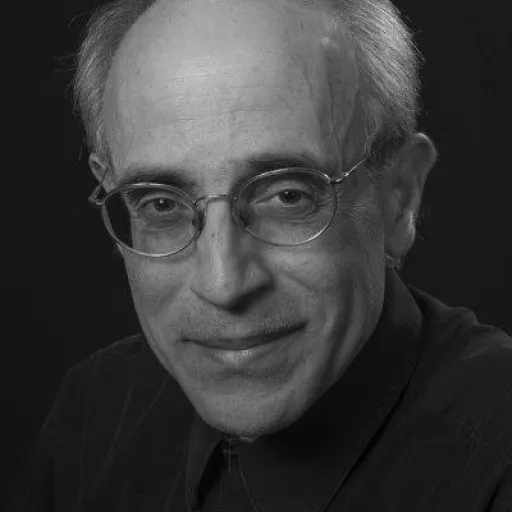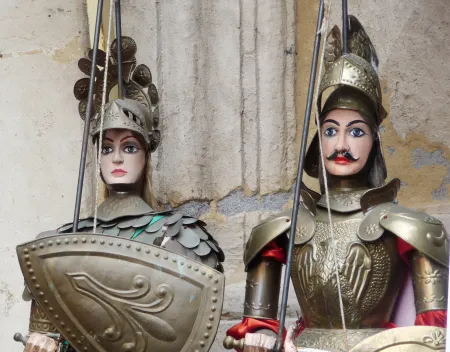On the streets of Palermo and Catania, as well as dozens of provincial towns, puppeteers perform grotesque adaptions of the Oresteia or Carolingian epics. Ragged children squeal and clap, while American tourists, better dressed but no less naïve, smile and consult their guidebooks. But adult Sicilians, wearing the black of perpetual mourning, sigh and shake their heads. What a comedown for gods and heroes! Once adored and obeyed, now jerked around to entertain strangers and vagrants! But we all must make a living in this world. Someone behind the scenes always pulls our strings.
As a boy, I attended similar marionette shows at Papa Manteo’s on Mulberry Street. My Sicilian mother wished to expose me to this dying tradition. After the Risorgimento, she explained, legislators and educators had frowned upon such plays because they were presented in the Sicilian language and extolled Sicilian history. Both were officially discouraged in favor of the Italian language, national unity, and later Fascism. Some puppeteers immigrated to the New World to make a living in urban Sicilian colonies. Agrippino Manteo, born near Catania, had brought his troupe from Mendoza, Argentina, to New York’s Little Italy after World War I. His grandson Mike allowed me to handle the family’s life-size puppets.
When I moved from ethnic Brooklyn to the white-bread suburbs of Freehold, New Jersey, I decided to stage my own marionette show. Mamma and I built a tiny theater on our patio. Against my father’s advice, I printed flyers in crayon and invited the entire neighborhood. The paladins in tin foil and gold tinsel baffled my playmates and the Sicilian barked behind the scenes must have sounded like gibberish to their parents. The audience remained polite. My kindergarten teacher burbled compliments. Then disaster struck. As the Normans routed the Scaracens at the Battle of Misilmeri, the backdrop tore and completely exposed me. Children pointed and jeered, adults laughed, but I was too shocked to react. It was as if the sky had split. My face burned, and tears stung my eyes.
After this public humiliation, I gradually stopped speaking Sicilian, much to Mamma’s distress. I did not fully comprehend what had happened to me, however, until I read Luigi Pirandello’s novel The Late Mattia Pascal. The great Sicilian writer compares life to a puppet show and existential anxiety to a torn paper sky.
Suppose, he says, if at the climax of a puppet show, just when the marionette playing Orestes is about to avenge his father’s death and kill his mother and her lover, a hole appeared in the paper sky of the scenery. What would happen? Orestes would become distracted and then obsessed by that hole. He would still feel his desire for revenge and still want passionately to achieve it, but his eyes always would return to that hole, from which more demons would escape than from Pandora’s Box and crowd the stage. They would mock Orestes until he became helpless; and at that moment, Orestes would become Hamlet (or worse, a parody of Hamlet). “There’s the whole difference between ancient and modern tragedy,” Pirandello concludes: “a hole torn in a paper sky.”
Lucky marionettes, over whose wooden heads the false sky has no holes! For this misbegotten generation of Pinocchios, disowned by Geppetto and abandoned by the Blue Fairy, the backdrop has been utterly shredded. Postmodern academics, gainfully employed and protected from the consequences of do-it-yourself nihilism, consider this devastating condition a prelude to universal liberation. Ordinary people know better. Without scripts, props, or direction, human culture does not inspire improvisation but terminal stage fright or compulsive hamming. We freeze or mug but cannot act.
“Without the aid of prejudice and custom,” William Hazlitt said, “I should not be able to find my way across the room; nor know how to conduct myself in any circumstances, nor what to feel in any relation of life.” Hazlitt wrote these words in 1830, when the Industrial Revolution, the engine born from the scientific and political revolutions of the previous century, had begun demolishing traditional Western values at full steam. A political radical, Hazlitt was no friend of the Old Order; but he understood and respected the human need for beauty and meaning, which is why he championed Romanticism. Music, painting, and poetry, however, could not patch the rift in the sky. Over the past 180 years, it has gotten only bigger. Why don’t we repair it?

